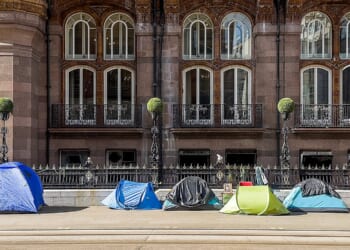Rod Dreher has a gift for prognostication. Well before anyone could see the rise of populist conservatism in reaction to encroaching secularism and institutional decline, Dreher wrote The Benedict Option, which described this evolution. Published in 2017, the book’s title quickly entered the lexicon of public discourse as many modern Christians made a tactical retreat away from the culture, forming intentional communities, rediscovering traditional values, and prioritizing their spiritual and moral well-being over status and material prosperity. This makes it one of the most important books of the 21st century.
Seven years later, Dreher came out with an equally prescient argument in his latest book, Living in Wonder: Finding Mystery and Meaning in a Secular Age.
Living in Wonder focuses on the problems of collective disenchantment and the resulting spiritual malaise. In many ways, the book feels like an updated version of Thomas Merton’s spiritual classic Seven Storey Mountain, with Dreher now seeking God in a skeptical and jaded modern world. Unlike Merton, who ends his journey by becoming a Catholic monk, Dreher finds his home in the Orthodox Church.
Before describing the problem of disenchantment in today’s post-Christian West, Dreher engages his readers in the introductory chapter, telling the stories of three people who had encounters with the supernatural: a man who mistook demons for space aliens, a former junkie who experienced a miracle in Jerusalem, and Dreher himself, who experienced God’s presence in the cathedral of Chartres. These accounts illustrate how people are often more moved by the spirit than they are moved by the mind or even the appetites.
He then explains how the West forgot about this fundamental truth and consequently became “disenchanted.” Whereas the denizens of medieval Christendom sensed God’s presence everywhere, people today lack this capacity as well as the very language to describe the world beyond their heads. Dreher asserts that nominalists in the 14th century, like William of Ockham, set the stage for later thinkers to dismiss metaphysical realities as subjective human constructs: “God was no longer mysteriously both transcendent and immanent but located radically outside of his creation, which he observed from afar, and upon which he imposed his will.”
From there, Western Christianity became increasingly rationalist, materialistic, and bereft of mysticism. The sacramental vision of the world, where all of creation points to God, was substituted for a scientific vision in which creation became dead matter to be controlled. On one hand, this allowed enormous progress in technology, productivity, and material wealth; on the other hand, society has become increasingly dehumanized and unhappy.
The West as a whole now stands at a crossroad. Either people can continue living disenchanted lives and attempt to find meaning outside Christianity, or they can learn to commune with the Christian God through prayer and humility.
Before making his case for the devout life, Dreher describes the alternatives that continue to gain new adherents by the day. He tells the story of Jonah, a religious scholar who was bored with his evangelical faith, leading him to start taking heavy psychedelics and become a satanist. After encountering a demon during one of his drug trips, he repented and became a Christian again.
Others seek enchantment in transhumanism, an ideology that espouses transcending human nature through advanced technology or in narratives about space aliens. To his credit, Dreher keeps an open mind to connect the appeal of these ideas to the crisis of disenchantment. Ironically, these pseudo-religions meant to circumvent Christianity almost always end up reaffirming its core truths about God’s existence and the supernatural realm.
In the second half of the book, Dreher offers his plan for reenchantment, which first requires returning to the faith of the early Christians and living a life of prayer. As all spiritual masters attest, “prayer is the chief way we open the flow between God and ourselves.”
Along with prayer is the need for beauty. A perfect articulation of St. Thomas Aquinas’ five proofs will fall on deaf ears if a person’s daily experience is marred by constant ugliness. Only beauty can inspire fervor and devotion in the human heart: “we need only to accept that beauty is a manifestation of God’s presence and then, out of love for that beauty, follow its lead down the sacrificial pilgrim’s path the Christians of the first millennium blazed.”
Finally, Dreher recounts various miracles that led to conversations (including his own), reinforcing the argument he has made thus far. One doesn’t need to take psychedelics, worship Baal, or plug into the Matrix to experience the supernatural. Miracles and visions happen all the time, and they continue to bring people away from the brink of destruction and despair. Once again, what saved them was not the practical or therapeutic benefits of the Christian faith, but the profound wonder that comes with belief.
In addition to challenging his readers to follow his example, Dreher also challenges churches and pastors to engage their flock on this level. Evidently, a friend of Dreher’s told him that churches in the American South “are swamped by young converts coming out of neo-paganism — and that this presents a huge challenge to clergy unprepared for it.” The thirst for enchantment is there, but it must be directed to the good, the true, and the beautiful, or else it will become warped and corrupted.
Although some Protestants and Catholics might take issue with Dreher’s repeated endorsement of Orthodox Christianity above all other denominations, most of what he argues is sufficiently ecumenical and applicable to other Christian traditions. He has found peace as a member of the Orthodox Church, so it is only fair that he preaches what he practices.
Altogether, Dreher makes a compelling case that a new age of the spirit is coming. Sadly, instead of living in wonder, people today live in the dread that working, consuming, and the limited reality they can perceive with their five senses is all there is in life. This is not sustainable, and it will eventually lead them to seek some form of enchantment. Christians and Christian communities should prepare for the arrival of these wandering souls, or risk losing them and Western civilization itself to spiritual darkness.

















